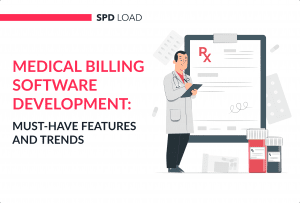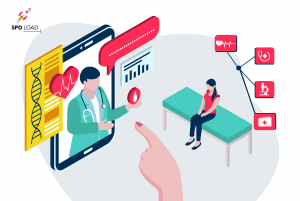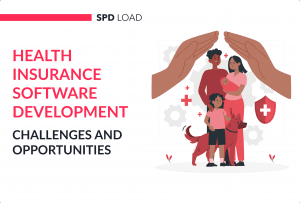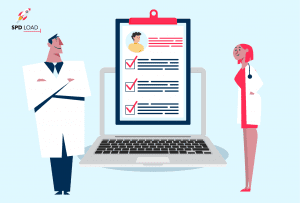Efficient Medical Billing Software for Error-Free Claims
- Updated: Nov 08, 2024
- 10 min
Every year, doctors in the US lose about $125 billion because of poor billing, an Equifax study reveals.
These losses happen because of human-made mistakes, claim denials, and delayed or missed payments.
Good medical billing software can fix these problems.
Medical billing software is an essential tool that helps automate the medical billing process.
This type of software is mainly used by hospitals, clinics, and many healthcare professionals out there.
It helps to organize the revenue cycle management, invoicement, and other payment-related tasks and handles insurance claims.
Plus, the software helps practices stay on top of regulations, avoiding penalties.
That is why the demand for such software is growing rapidly.
In this guide, we’ll cover everything you need to know on how to develop customizable medical billing software to keep a medical practice financially healthy.
Find out how healthcare technology trends are transforming patient care and healthcare delivery.
Get a strategic MVP to mitigate risks.
Medical Billing Software Market Overview
The medical billing software market is growing rapidly.
In 2023, the market was estimated at $109.05 million.
It is projected to be $32.77 billion million by 2028, with a 14% CAGR.
The market growth is driven by the growing need to manage health records and claims efficiently and reduce paperwork and time.
The software automates different parts of the healthcare billing cycle, from scheduling to electronic payments.
This helps medical providers to streamline and reduce errors. 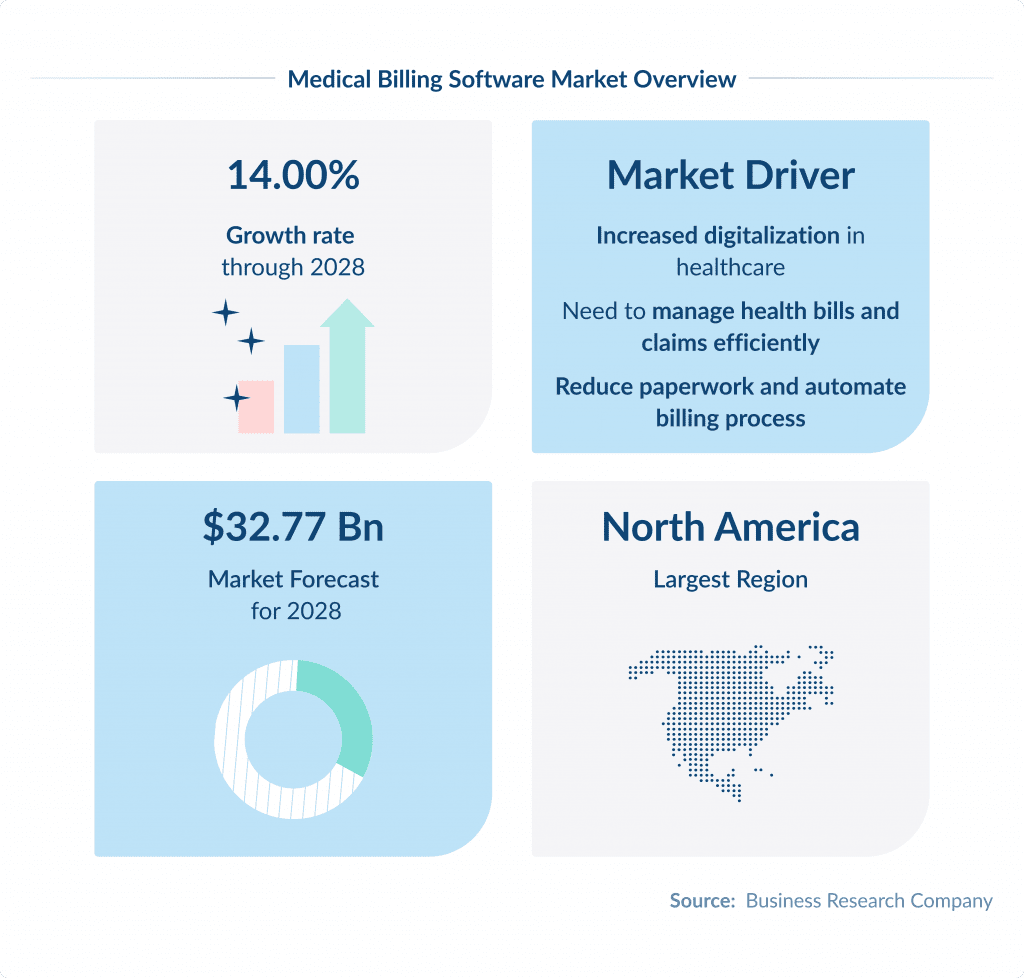
Benefits of Using Billing Software for Healthcare Organizations
According to an InstaMed report, 75% of US providers still use paper and manual processes for collections.
This is very time-consuming and prone to manual data entry errors.
To eliminate the risks of mistakes, healthcare providers can use special software that simplifies the payment processes instead.
Here are a few reasons why it is a good option.
Improved Billing Process Efficiency
All modern medical billing products need to conduct their key function: automate the billing process.
In this case, the healthcare accounting staff will be more efficient and less likely to make errors.
Plus, the billing software allows medical practices to automate their other activities.
These are sending patient payment reminders, verifying insurance coverage, and submitting insurance claims automatically.
Claim submission will still require manual validation of service codes to prevent denials, but submitting claims will be much easier.
Innovation is the key to leadership. Here’s how to win the technology race in the healthcare industry.
Reduced Chances of Mistakes
With Advanced medical billing software uses an algorithm that keeps patient claims error-free before submission.
Medical billing software streamlines coding to give practitioners accurate reimbursements that are based on information from multiple sources, medical reports, and procedures.
Medical billing platforms with AI capabilities can streamline and automate coding, charting, and data entry more efficiently.
Merging coding functions with patient databases can reduce claim denials, increase revenue, and smooth healthcare management.
If you are looking for ways to enhance your development, AI is a game-changer.
Check out the AI development tools we use for software development. These tools enhance our projects and streamline development workflow.
Minimized Administrative Costs
With automation tasks like claims submission, payment tracking, and follow-ups, the software decreases the time and staff needed to manage billing activities.
This leads to fewer errors, less time spent correcting mistakes, and quicker payments.
All of that reduces the overall administrative burden and associated costs.
Additionally, since the routine tasks are handled automatically and staff can focus on more important duties.
This further increases efficiency and cost savings. 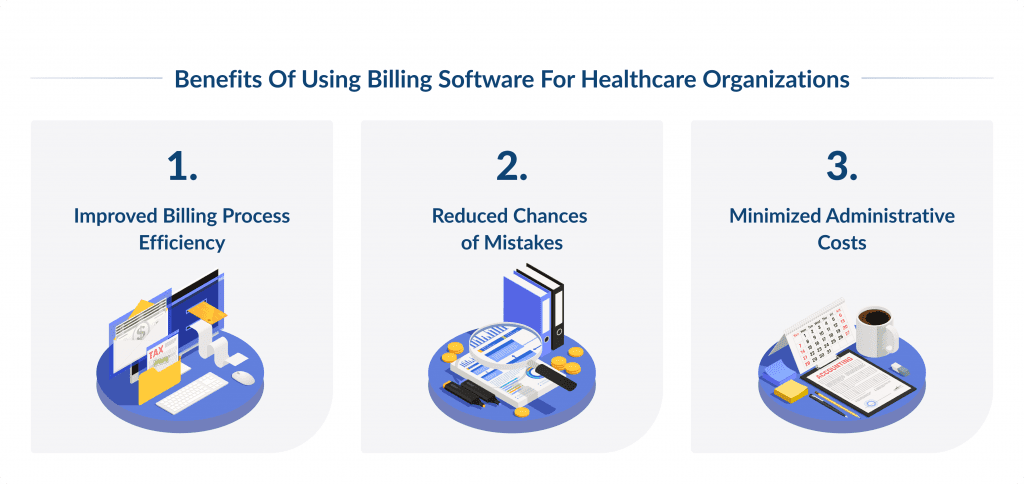
So, what are the essential features of the best medical billing software that users highlight?
Let’s see.
Key Features of Billing Software
Medical billing software has various features.
All of them are designed to streamline the billing process and improve efficiency for healthcare providers.
Here are some of the key features:
Patient Portal
A patient portal feature allows patients to view their bills, pay, and communicate with their providers online.
It helps to increase patient engagement and simplifies the billing process.
Automated Claims Processing
This feature generates, submits and tracks insurance claims automatically.
It reduces manual work and errors, speeds up the process, and minimizes claim denials.
Denial Management
Denial management tools allow users to track and manage denied claims, see why claims were denied, and how to resolve them quickly.
This is key to increasing revenue and reducing rework.
AdvancedMD has denial management features that allow users to see and fix issues that cause claim denials.
Financial Reporting
Integrated billing functionality delivers detailed financial reports and analytics to help practices monitor their revenue cycle and financial health.
Understanding ARR is essential for scaling. Use the ARR calculator to keep track of your performance.
HIPAA Compliance
Compliance tools help ensure that billing practices adhere to the latest healthcare regulations and hence, eliminate the risk of penalties.
Discover the best HIPAA-compliant chat apps to ensure your conversations meet strict security standards.
Explore our guide to cybersecurity trends and see what your organization needs to stay secure.
Patient Communication
Enhances customer support through portals that allow them to view their bills, make payments, and communicate with their healthcare providers.
Integration
The software is integrated with other systems.
For example, Electronic Health Records (EHR), Electronic Medical Records, and practice management software to provide a seamless workflow.
Here, we explore the most effective EHR integration strategies, along with timelines and costs involved.
Mobile Access
Offers mobile applications for on-the-go access to billing information and patient records.
These features help healthcare providers reduce errors, improve efficiency, and maximize revenue.
Some of the top medical billing software providers incorporate these features to cater to the needs of their clients. 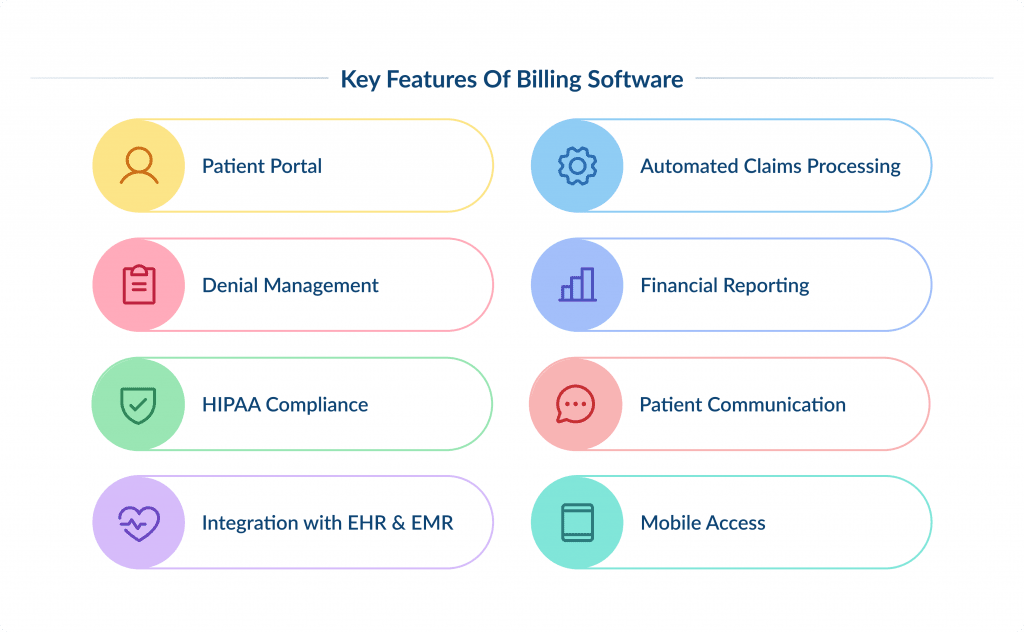
What Are the Types of Medical Billing Software?
The features listed above can boost the efficiency of healthcare practices and enhance the overall patient experience.
However, the set of features might be similar for different types of software.
The next question is this: What type of medical billing software should you develop?
Let’s explore the five main types and look at their benefits and drawbacks.
1. Cloud-Based Billing Software
Businesses aiming to stay competitive are investing in cloud-based app development for enhanced scalability.
Cloud-based billing software is an online system that allows you to manage invoices and payments from anywhere with an internet connection.
Pros
- Easily scales with growth without costly hardware upgrades
- Accessible from anywhere with internet concertion
- No need for local server maintenance, as the service provider handles all IT infrastructure
Cons
- Requires a stable internet connection
- Typically operates on a subscription model, this can translate into higher long-term costs
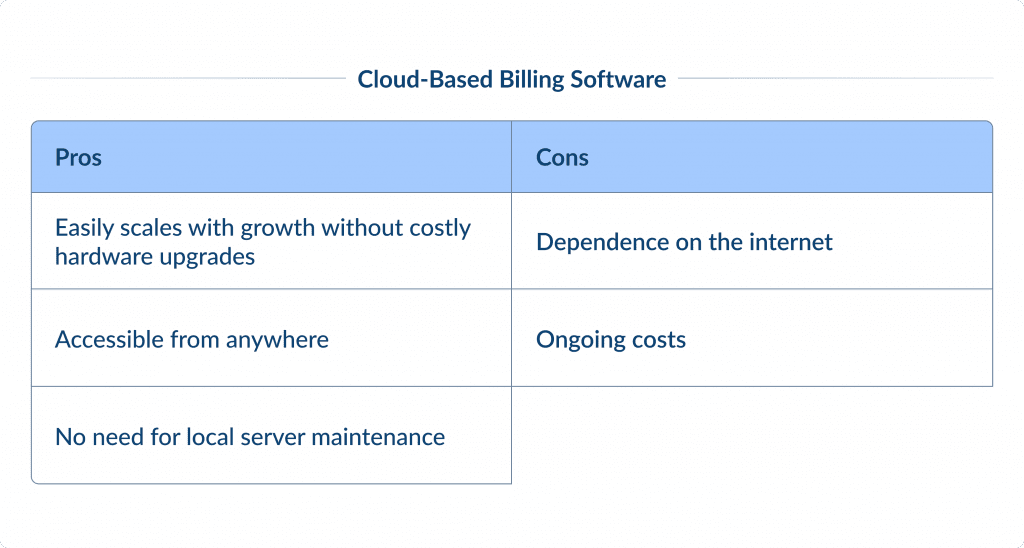
2. Stand Alone Billing Software
Stand-alone billing software is a system installed directly on a computer or server that operates independently without an internet connection.
This type of software is for practices that want to manage their billing locally without cloud services.
Pros
- Has advanced features for medical billing, this is a good choice for small practices
- You have full control over data and software updates
Cons
- Not integrated with other practice management systems or EHRs
- Requires local IT support and infrastructure
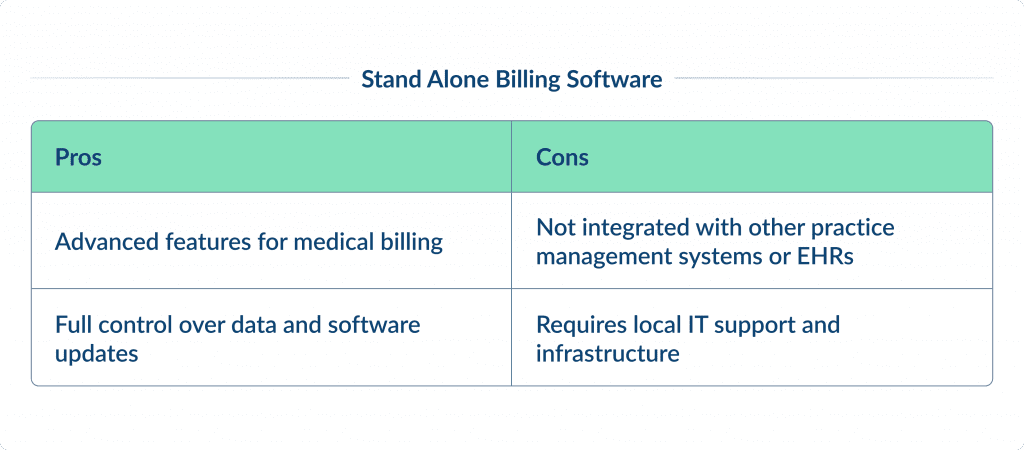
3. Integrated Medical Billing Software
As the name implies, integrated medical billing software integrates medical billing with other functions like appointment scheduling, electronic health records, and patient management.
Pros
- All in one solution that manages all aspects of practice operations from one platform
- Reduces the need for multiple software solutions and minimizes data entry errors
Cons
- More complex to develop, set up and use, and requires more training
- More expensive to create because of complex functionality
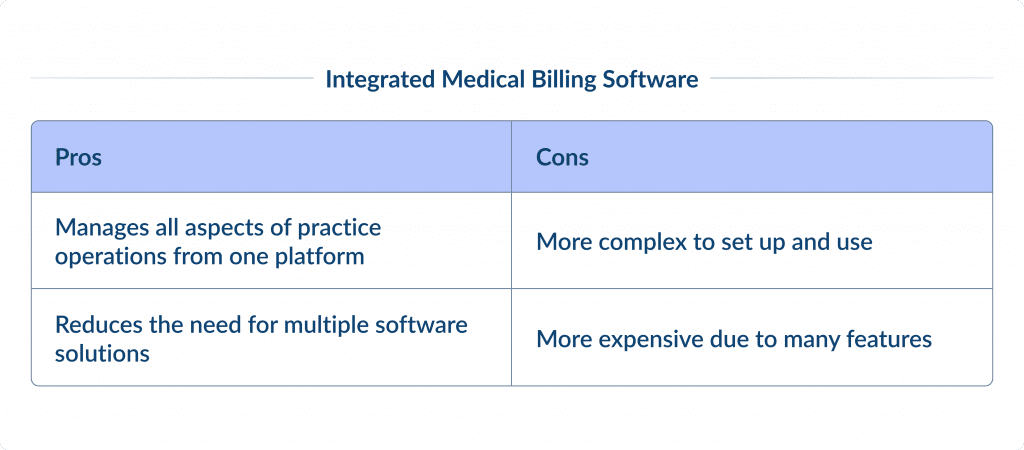
4. Customized Billing Software Solutions
Customized billing software solutions are designed with your services in mind.
Instead of one size fits all, these systems are tailored to your specific workflows and preferences.
This makes the billing process more frictionless and efficient specifically for your organization.
Pros
- Matches your practice’s specific workflow
- Can be modified over time to reflect changes in practice, size or regulations
Cons
- More expensive to develop and implement
- Takes longer to deploy than off the shelf software
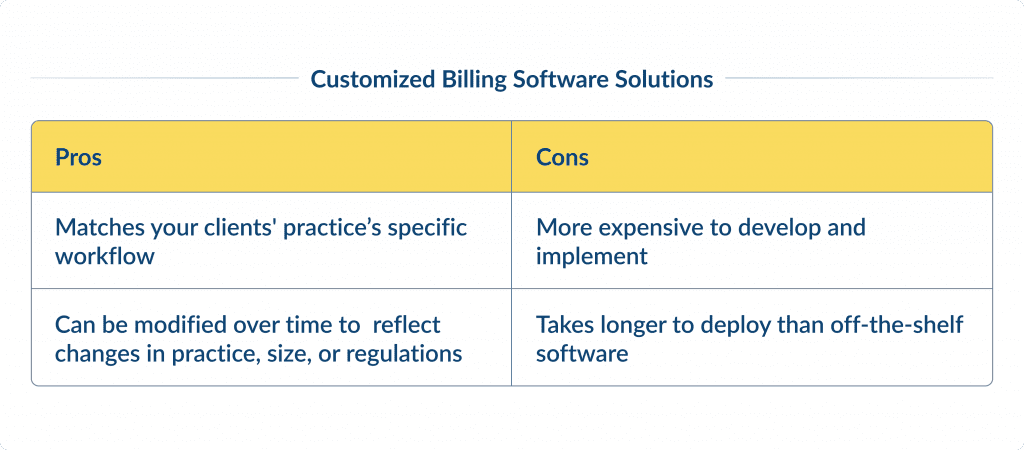
Steps to Develop Medical Billing Software Solutions
To develop a medical billing solution, you need two things: a business idea and a dedicated development team to realize your idea.
Here is how we approach the development process in Spdload.
The entire process is divided into several parts. These are planning, MVP development, development, testing, launch and maintenance.
Let’s explore each of them in detail.
Medical billing software development cost will depend on the set of features you choose, the tech stack, and the development team’s location.
Planning
We kick off the development process by gathering all the necessary requirements for your medical billing solution.
Our team works closely with you to define clear deliverables, set realistic timelines, and establish key success metrics.
This stage is all about laying a solid foundation, ensuring everyone is aligned before any coding begins.
MVP Creation
The next step is to launch MVP.
Here, we focus on designing an intuitive, user-friendly interface that fits seamlessly with healthcare workflows and your brand.
The goal of the MVP is to develop a basic version of the software that includes the most essential features.
We launch this early version to gather feedback from real users.
This early feedback allows us to make adjustments and improvements before full-scale development.
Good design can make all the difference. Check out our step-by-step guide on healthcare app design.
Development
Once the MVP is validated, it is time to move on to full-scale development.
At this point, we set up the backend infrastructure and APIs, create machine learning models if needed, and ensure seamless integration with Electronic Health Records (EHRs) and Electronic Medical Records (EMRs) (learn more about the benefits of EMR systems).
Our team builds a scalable, secure, and fast architecture to support your software.
For mobile applications, we develop native iOS or Android apps with encryption and access controls.
For more detailed information, check out these detailed guides on Android app development costs and iOS app development costs to better navigate the financial aspects.
We also ensure the app is HIPAA compliant and meets all regulatory requirements.
Testing
We rigorously test across devices and connectivity and fix defects.
This stage is critical to ensuring that the software runs smoothly in real-world conditions, providing a reliable tool for the healthcare billing process.
Check out these five usability testing ways that will help elevate your startup’s performance.
Launch and Maintenance
Finally, we prepare for the software’s launch.
Now, our team finalizes all project documentation and submits the app to the App Store or Google Play Store.
After the launch, our work doesn’t stop.
We provide ongoing maintenance to ensure the medical billing workflow continues to run smoothly and stays up-to-date with any changes in technology or regulations. 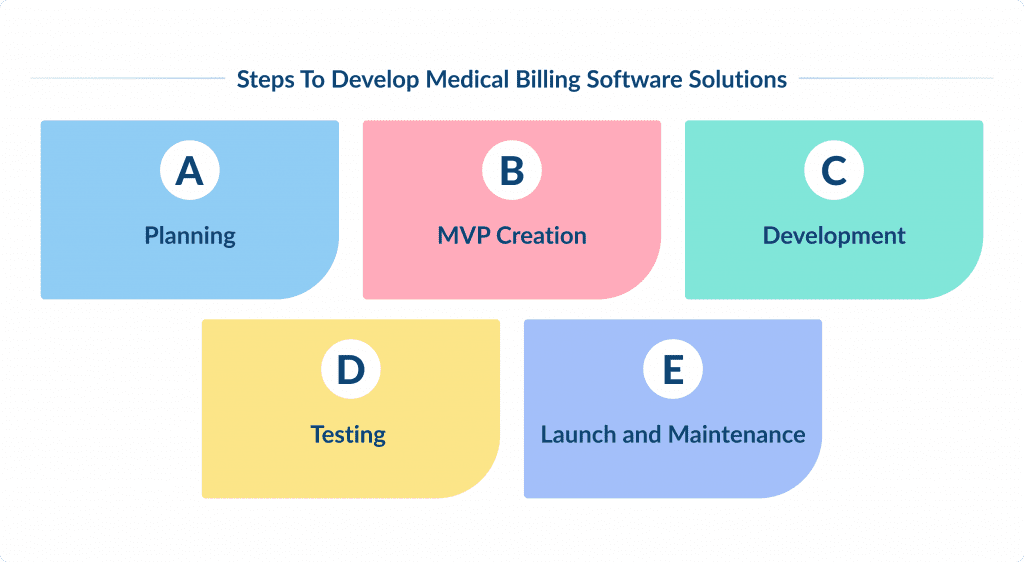
The Obstacles in Medical Billing Software Development
The healthcare industry has its own set of challenges in software development.
And medical billing software is not and exception.
Let’s explore some of the most common obstacles.
-
Data Security and Privacy
Patient data is the most sensitive in healthcare and requires the highest level of security.
Developers need to build software that adheres to strict regulations like HIPAA Compliant App Development (Health Insurance Portability and Accountability Act).
These standards are not only for client trust but also for legal compliance, so patient data is private and secure.
-
Integration Across Multiple Platforms
The healthcare system has many devices and systems.
The biggest challenge is to integrate medical billing software with all these platforms.
If not, it will disrupt the medical process, and ultimately, the software will not work.
So developers need to focus on building an integration interface that allows smooth financial transactions within various Electronic Health Records (EHRs) and other healthcare systems.
-
Overcoming Billing Errors
Recent surveys like the one conducted by Zelis and Hanover Research show that many patients are frustrated with the billing process.
The challenge for developers is to build medical billing software that automates the process to eliminate billing errors.
It involves ensuring the data and codes are accurate which is crucial for patient experience and satisfaction with the billing process.
Partner with SPDLoad to improve how you deliver patient care
Ready to Kick Start Medical Billing Development?
Looking for a software development partner to develop a healthcare solution? Spdload is here for you.
With over 10 years of healthcare mobile application development experience we have the knowledge and expertise to create a solution that will help you to offer and deliver healthcare services better.
Future of Medical Billing Development
What does the future hold for the medical billing development market?
Here are a few trends we have noticed when researching the industry reports.
Focus on the Security of Payments and Claims Process
In the last few years, cyber crimes have been rising at a concerning rate. This further increases privacy concerns pertaining to the patient’s medical history and other personal information.
In 2015, the Indiana Attorney General informed that data of over four million patients of 230 hospitals were exposed during the cyber-attack on Indiana-based firm, Medical Informatics Engineering (MIE).
Increasing cyber threats such as malware, phishing, Man in the Middle attack, and Trojans, among others, are hindering the market growth to some extent.
With the rise in cyber threats, billing software will adopt more advanced cybersecurity measures to protect sensitive patient data.
This includes stronger encryption, multi-factor authentication, and regular security audits.
Health Info Security suggests that in the future, more stringent security protocols in billing software will be used to counteract the increasing threat of cyberattacks.
Medical Billing And EHR Software Becoming Interoperable
HIT Consultant highlights how integrating medical billing with EHR software can improve efficiency and accuracy for healthcare providers. Learn more about EHR software development services.
Integrating medical billing with electronic health records is becoming a popular trend because it offers a lot of benefits for healthcare providers.
One of the biggest perks is that it saves time on data entry — no more entering the same patient information twice.
This not only speeds things up but also helps reduce errors, which means fewer denied claims and better reimbursement rates.
Plus, having everything in one place makes it easier to manage all aspects of the practice without juggling multiple systems.
This integration also improves communication within the practice, making it simpler to find and share information.
As more hospitals and clinics start using this technology, it’s expected to drive growth in the market.
Explore the benefits of electronic health records and why they’re essential for modern healthcare. 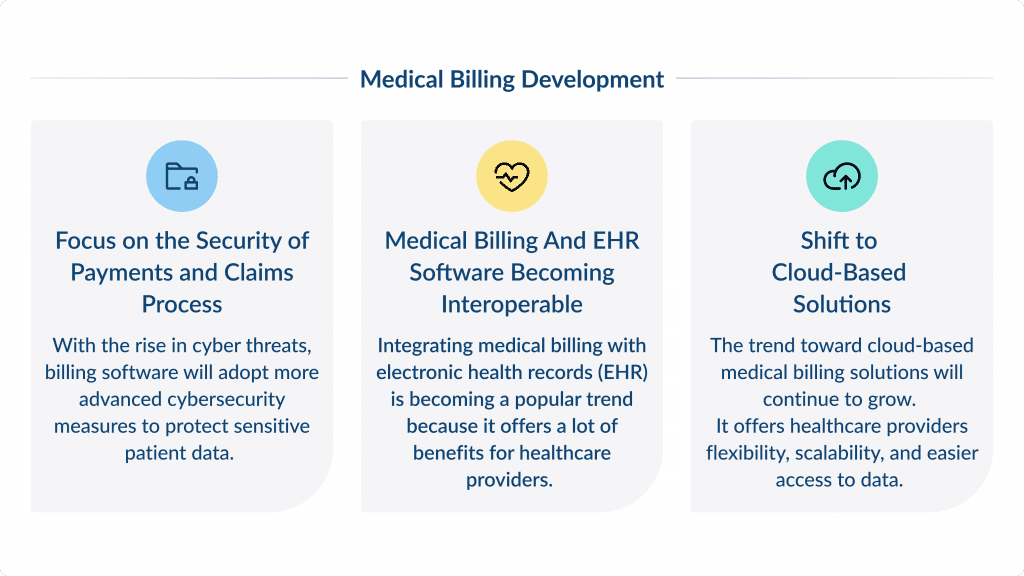
Choosing the right EHR system is crucial. Learn more on how to select an EHR that fits your healthcare needs.
Shift to Cloud-Based Solutions
Gartner Healthcare Survey says cloud based healthcare solutions like billing will rule the market. The reason being cost and accessibility.
Cloud-based medical billing will continue to grow.
With such kind of software, healthcare providers will have flexibility, scalability, and easier access to data.
Cloud will also enable better collaboration between different healthcare providers.
Technology, patient needs and demand for security and efficiency will shape the medical billing future.
Consider these when you are getting your medical billing software updated or developed from scratch.
Learn about effective bot attack prevention strategies to safeguard your site and data.




